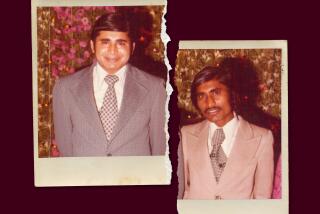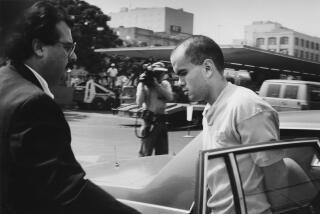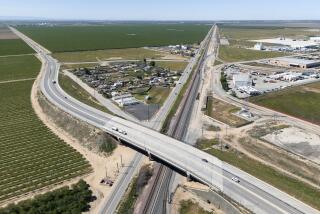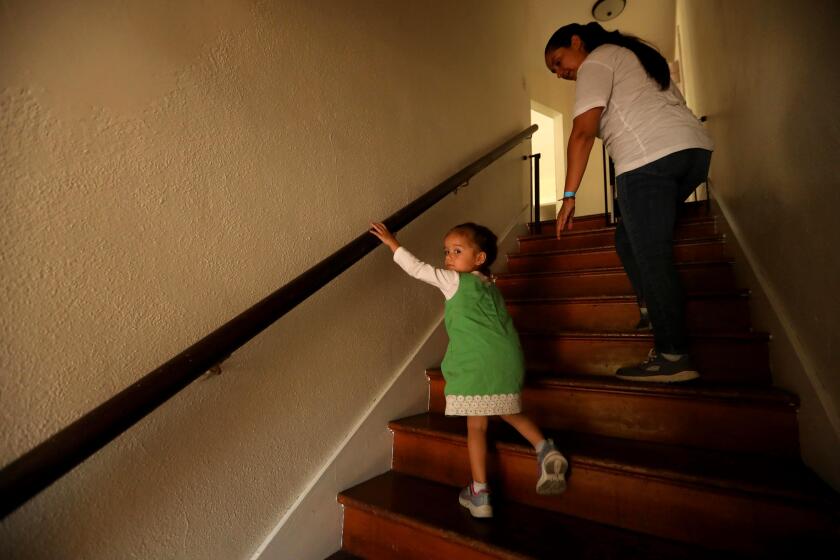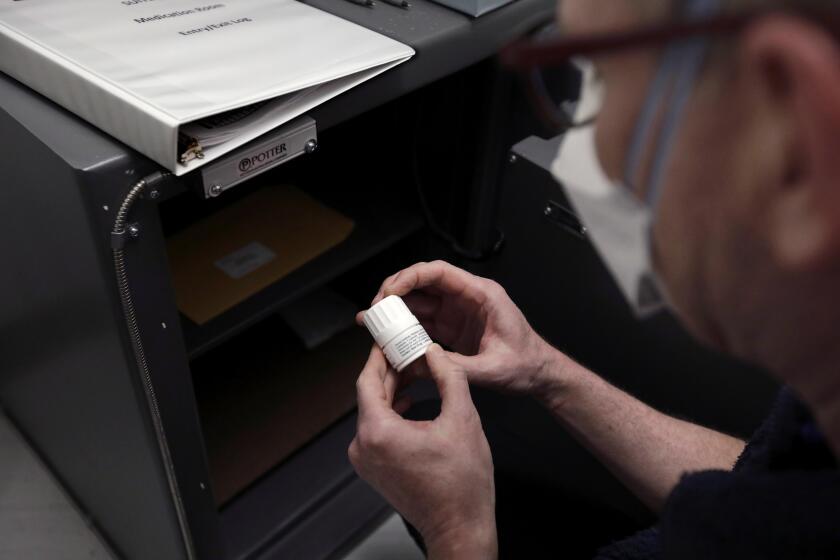Backers Call Hearing to Speak Up for the Chief
With the clock ticking toward a crucial deadline for Los Angeles Police Chief Willie L. Williams, supporters hailed his record Thursday during an unusual public session that illustrated the tensions in the debate over Williams’ expressed intention to seek a second term.
Gathered in a South-Central Los Angeles elementary school auditorium, a series of prominent residents and ordinary citizens rose to testify in support of the chief, focusing primarily on the drop in the city’s crime rate and the falling number of complaints filed against police officers. Some of the speakers expressed amazement that their positive impressions of Williams do not seem to be shared at City Hall, where some officials voice disappointment in the chief’s management skills and harbor doubts about his honesty.
For the record:
12:00 a.m. Dec. 28, 1996 For the Record
Los Angeles Times Saturday December 28, 1996 Home Edition Part A Page 4 Metro Desk 2 inches; 63 words Type of Material: Correction
Chief meeting--Adrian Dove was misidentified in a Dec. 27 article about a community meeting called in support of Police Chief Willie L. Williams. Dove is a board member of the Greater Los Angeles African American Chamber of Commerce, not the organization’s president. The executive director of the chamber said Friday that Dove’s participation in a community evaluation of Williams does not reflect any official participation by the organization.
Thursday’s session was called by supporters of the chief, in part to build their case for his reappointment and in part because they fear that political leaders may act quickly to reject Williams’ efforts to stay at the helm of the Los Angeles Police Department. The event was cast as a public hearing, and about 50 people turned out for it, including representatives of the Congress of Racial Equality, the NAACP, 100 Black Men and the Greater Los Angeles African American Chamber of Commerce--all prominent, influential organizations.
Members of the panel hearing testimony intend to produce an evaluation of Williams next week, days before the chief’s deadline to apply for renewal. Because that evaluation is likely to be favorable, supporters of the chief see it as a potential counterpoint to the negative assessment they fear the city’s Police Commission will reach in the event that Williams seeks a second term.
Mayor Richard Riordan has declined to comment on whether he believes Williams deserves a second term--instead saying he wants to leave that decision to the city’s Police Commission, whose members are appointed by the mayor. But Riordan has criticized some aspects of LAPD management, and many of Williams’ supporters see the mayor as an adversary, a sentiment that was evident Thursday.
“It is inconceivable that a mayor would attack a police chief such as we have today,” said one witness, Mike Gibson, a lifelong Los Angeles resident and community activist. “This man has spent his time . . . trying to do everything he can about crime.”
*
Samel McNeal, founder of a group known as the Unity Empowerment Coalition, agreed. Under Williams’ leadership, McNeal said, “To protect and to serve . . . is becoming more than a slogan. It’s becoming a reality.”
The disparity between the perceptions of some leaders and those of some members of the public has made the discussion of Williams’ second term a delicate affair--one exacerbated by the fact that Williams is the LAPD’s first African American chief and one of Los Angeles’ most popular public officials. Under a charter amendment approved by voters in 1992, the Police Commission is responsible for deciding whether Williams deserves a second term; that panel’s decision can be reviewed by the City Council, but it would take 10 votes to overrule the commission. Williams does not now appear to enjoy that much support.
Conscious of the potential for a destructive debate over Williams’ qualifications, some city officials are exploring the merits of offering the chief up to $250,000 in return for his decision not to pursue a second term. So far, no such deal has been struck, and some people close to the issue are giving up hope that a financial deal can be arranged.
Williams, meanwhile, is weighing an offer for a job in the Clinton administration even as he has publicly stated that he wants another five years at the LAPD. He has until Jan. 7 to formally reapply for the police chief job.
That leaves less than two weeks, and organizers of Thursday’s public hearing rushed to convene the session--spreading the news by word of mouth and by a faxed “emergency community alert”--because they feared they could not wait any longer.
“This could all roll very fast,” said Adrian Dove, president of the Greater Los Angeles African American Chamber of Commerce and one of the event’s sponsors. “If we are to play a role in this process, this is the time.”
Dove said he and other members of the panel that heard testimony will sift through the witness statements, as well as questionnaires and other materials before releasing their evaluation of Williams next week.
The effort is not intended to be a comprehensive citywide opinion poll. A few dozen questionnaires were passed out Thursday, and thousands more copies are being printed and distributed, mostly to residents of South-Central.
Even the questions included on that survey demonstrate how far apart the community and the city’s political leaders may be in considering Williams’ merits. The six questions ask for residents’ perceptions of crime and safety and then ask whether Williams should be reappointed.
And one of the questions suggests the community group’s distaste for the members of the city’s Police Commission.
*
“Which do you feel is most important?” the question asks, offering as possible responses: the “relationship between a police chief and appointed police commission” or “the accessibility of a chief to all communities in the city.”
Police Commission President Raymond C. Fisher, a longtime civil rights advocate who served on the Christopher Commission, has emphasized that Williams will not be judged on his ability to get along with the commission but rather on his overall effectiveness as chief. Fisher and other commissioners have declined to say how they might vote, but their 1996-97 goals for Williams suggest that the commission may use a far more elaborate set of criteria than the one being used by the citizens’ panel.
To be sure, the Police Commission’s goals cover some of the same ground. A copy of the panel’s 1996-97 objectives for the chief reveals that some of the commission’s standards directly bear on issues of crime and community security, topics generally covered in the citizens’ questionnaire. As established by the Police Commission, the chief’s performance goals include reducing serious crimes, improving emergency response and identifying new ways to respond to disasters.
*
But the commission’s 49 goals for Williams also stress his effectiveness as a manager. The goals direct him to develop a system for auditing LAPD systems such as its investigations of officer-involved shootings and other operations, to press for reforms recommended by a blue-ribbon commission in 1991 and to strengthen the department’s commitment to community-based policing.
The commission also directed Williams to show improvement in some more fundamental areas, calling upon him to follow directions, to “demonstrate a professional work ethic and commitment to leadership” and to “minimize the time absent from duty and from the city and respond timely to significant and unusual events.”
To many outside city government, however, those mandates are far removed from their impressions of Williams.
One businessman testified Thursday that Williams has helped create a climate of stability in Los Angeles, one in which investors feel more comfortable. A college administrator said Williams is a fair and decent man, and said he is only being criticized because he is black. A Neighborhood Watch leader said Williams is dynamic and is being hamstrung while trying to do his job.
Only one person, retired Police Officer Musa Camara, spoke out against Williams. Camara, an outspoken LAPD officer who long raised complaints of racism within the department, said the chief has not done enough to attack that problem.
“In my opinion,” Camara said, “Chief Willie Williams has not been a friend of African American officers and, by extension, he has not been a friend of the African American community.”
Still, nearly every witness who testified Thursday spoke glowingly of Williams’ tenure, in particular crediting the chief with helping to reduce crime in Los Angeles. Even Williams’ critics acknowledge that crime is down significantly over the last four years, but they note that the local decline is part of a national trend, and many cities have enjoyed far greater reductions than Los Angeles.
Although the opinions of elected officials are not being sought as part of the citizen panel’s evaluation of the chief, Williams’ strongest City Hall supporter did speak briefly to the group Thursday. Councilman Nate Holden downplayed various controversies surrounding the chief and said Williams had earned a second term.
“The chief is liked by people all across this city,” Holden said. “They like him, even if the politicians don’t.”
More to Read
Start your day right
Sign up for Essential California for news, features and recommendations from the L.A. Times and beyond in your inbox six days a week.
You may occasionally receive promotional content from the Los Angeles Times.
